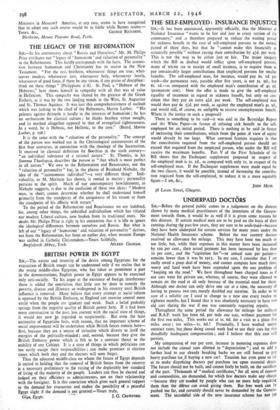THE LEGACY OF THE REFORMATION
Sin,—In his controversy about " Russia and Ourselves," Mr. M. Philips Price attributes our "legacy of ' humanism' and valuation of personality " to the Reformation. This hardly corresponds with the facts. The connec- tion between humanism and Christianity has its source in the New Testament. " For the rest, brethren, whatsoever things are true, what- soever modest, whatsoever just, whatsoever holy, whatsoever lovely, whatsoever of good fame, if there be any virtue, if any praise of discipline: think on these things " (Philippians 2:8). St. Paul, a " Hebrew of the Hebrews," here shows himself in sympathy with all that was of value in Hellenism. This sympathy was shared by the greatest of the Greek Fathers, as it was by the two leading minds in the West, St. Augustine and St. Thomas Aquinas. It was just this comprehensiveness of outlook which was lacking to the chief of the Reformers, Martin Luther. "His polemic against Aristotle is hardly in the interests of humanism ; he has no enthusiasm for classical culture ; he thinks heathen virtue nought, and its method altogether opposed to that of evangelical righteousness. In a word, he is Hebraic, not Hellenic, to the core." (Beard, Martin Luther, p. 198.)
It is the same with the " valuation of the personality." The concept of the person was worked out in the Christological controversies of the first four centuries, in connection with the theology of the Incarnation. It received its classical definition by Boethius in the sixth century- " an individual substance of a rational nature." St. Thomas, in his Summa Theologica, describes the person as "that which is most perfect in all nature." We owe to the Reformation and Renaissance, not the " valuation of personality " bat, in the phrase of Reinhold Niebuhr, the idea of the " autonomous individual "—a very different thing! Indi- viduality, as M. Maritain has shown, is rooted in matter ; personality pertains to the spirit. Much of our contemporary bewilderment, as Niebuhr suggests, is due to the confusion of these two ideas: " Modern man, in short, cannot determine whether he shall understand himself primarily from the standpoint of the uniqueness of his reason or from the standpoint of his affinity with nature."
To the period of the Reformation and Renaissance we are indebted, for, among other things, the unbridled individualism which has vitiated our modern Liberal culture, now broken from its traditional roots. No doubt Mr. Philips Price is right in his contention that it is idle to ignore the ideological differences between ourselves and Russia. But what is left,of our "legacy of ' humanism' and valuation of personality " derives, not from the Reformation, but from an earlier day, when western Europe was unified in Catholic Christendom.—Yours faithfully,






























 Previous page
Previous page